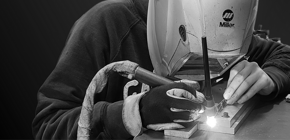Welding is an art that combines skill, precision, and innovation. When it comes to military applications, the stakes are higher than ever, demanding welders with exceptional expertise and a keen eye for detail. Specializing in mil-spec welding is a challenging yet rewarding path that requires a unique set of skills and a deep understanding of stringent military specifications. In this blog post, we'll delve into what it takes to specialize in mil-spec welding and the key factors that contribute to success in this specialized field.
Mastery of Military Specifications:
Mil-spec welding involves adhering to specific standards and guidelines set by various military branches, such as the United States Department of Defense (DoD) and its various agencies like MIL-STD-248, NAVSEA, and more. A mil-spec welder must understand these specifications in-depth, including material requirements, weld joint configurations, welding processes, and quality control measures.
Expertise in Welding Processes:
Mil-spec welding encompasses a range of welding processes, each suited for different applications. These may include Shielded Metal Arc Welding (SMAW), Gas Metal Arc Welding (GMAW), Gas Tungsten Arc Welding (GTAW), and more. Specializing in mil-spec welding means mastering these techniques, knowing when and where to apply them, and adapting to the specific needs of military projects.
Advanced Material Knowledge:
Military applications often involve diverse materials, including high-strength alloys, exotic metals, and specialized coatings. A mil-spec welder should deeply understand the properties, behaviors, and challenges associated with these materials. This knowledge is essential for selecting appropriate filler materials, managing heat input, and ensuring the structural integrity of welds under demanding conditions.
Precision and Attention to Detail:
Mil-spec welding demands the highest level of precision. Welders must consistently produce sound welds that meet strict tolerances and quality standards. Attention to detail is crucial to avoid defects such as cracks, porosity, or inclusions that could compromise the integrity of military equipment and systems.
Quality Control and Inspection Skills:
Quality assurance is paramount in mil-spec welding. Welders must be proficient in non-destructive testing (NDT) methods like radiographic testing (RT), ultrasonic testing (UT), and magnetic particle testing (MT) to identify flaws that may not be visible to the naked eye. A specialized mil-spec welder is well-versed in conducting thorough inspections and ensuring welds meet or exceed military requirements.
Commitment to Safety and Compliance:
The safety of military personnel and equipment is non-negotiable. Mil-spec welders must adhere to strict safety protocols for their own well-being and the integrity of the welded structures. Compliance with safety regulations and the use of proper protective gear are essential components of mil-spec welding specialization.
Continuous Learning and Adaptation:
The field of mil-spec welding is dynamic, with evolving technologies, materials, and standards. Specialized welders are committed to staying up-to-date with the latest advancements, attending training programs, and continuously improving their skills to meet the changing demands of military applications.
Becoming a specialized mil-spec welder is a journey that requires dedication, continuous learning, and a passion for excellence. These skilled professionals play a vital role in ensuring the reliability, safety, and effectiveness of military equipment and systems. By mastering military specifications, welding processes, material knowledge, quality control, and safety practices, mil-spec welders contribute to the success of critical defense projects and uphold the highest standards of welding in the military sector.

COMMENTS